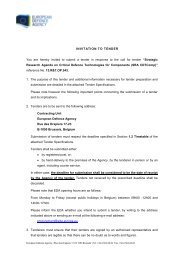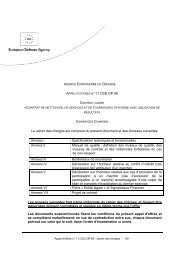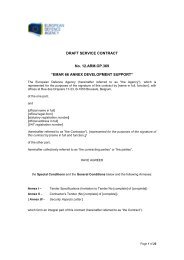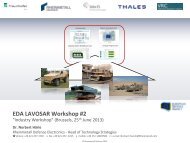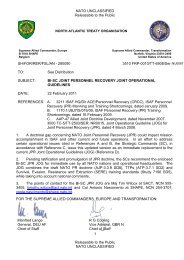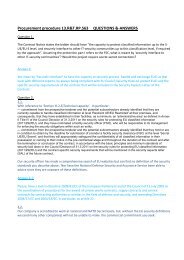capability development plan - European Defence Agency - Europa
capability development plan - European Defence Agency - Europa
capability development plan - European Defence Agency - Europa
You also want an ePaper? Increase the reach of your titles
YUMPU automatically turns print PDFs into web optimized ePapers that Google loves.
STRATEGIC DRIVERS<br />
15. Training - Armed forces may be tasked to address criminal activities through closer international<br />
and interagency cooperation in crisis management operations. This may include growing relevance of<br />
internal security activities of armed forces, which may result in new conceptual and doctrinal<br />
considerations.<br />
16. Equipment - In an international context where the numbers of crises outside Europe is likely to<br />
multiply, it may become necessary to review the capabilities of the armed forces to deploy to overseas<br />
theatres of operation.<br />
17. Manpower - A recruitment problem may arise for the armed forces in Europe as competition for<br />
skilled young personnel is likely to increase. The commercial world will often be able to offer more<br />
attractive conditions and pay.<br />
© sxc.hu<br />
39<br />
GLOBAL GOVERNANCE & INTERNATIONAL LAW<br />
MAJOR TRENDS<br />
1. The world will continue to grow more interdependent and more complicated. Transnational<br />
pressures, competition and globalisation will challenge the robustness and resilience of governance<br />
and social mechanisms at every level.<br />
2. The strategic outlook and interests of key state actors may grow more divergent and their<br />
willingness and ability to enter multilateral commitments is likely to vary as new players, such as China<br />
and India, alter the balance of power.<br />
3. The exercise of national sovereignty will increasingly be expressed in support of collective<br />
international action but regimes and policies will continue to act to protect their citizens and their vital<br />
interests. A range of weak or failed states, on the other hand, will continue to pose a security problem.<br />
4. States will remain central actors of global governance but non-state actors are likely to acquire more<br />
influence and affect the context in which states and inter-governmental organisations operate. Cooperative,<br />
competitive or conflictive interactions between government, business and trans-national civil<br />
society is likely to grow in intensity and scope. Terrorist networks and trans-national organised crime<br />
will continue to exploit and abuse this increasingly complex patchwork of arrangements and may<br />
weaken the state’s monopoly of violence.<br />
5. Against the shortcomings of global institutions, the role of alternative forms of governance will be<br />
required to cope with complex, inter-connected global and regional problems.<br />
6. The international law on the use of force will need to adjust to these <strong>development</strong>s. Striking an<br />
acceptable balance between effectiveness and legitimacy will be the key challenge, not least because<br />
the very notion of legitimacy is likely to be contested. In addition, there may be a broadening of the<br />
criteria for the use of force in the case of anticipatory self defence.<br />
POTENTIAL SOURCES OF CONFLICT, THREAT AND HUMANITARIAN TRAGEDY<br />
7. States and communities will be increasingly challenged by wide-ranging and complex transnational<br />
risks such as the challenges of a globalised economy and some will not cope. Strategic state failure<br />
will be a feature of the geopolitical landscape. In a world with a pervasive electronic communications,<br />
mobile populations and 24/7 media interest, local challenges to stability and order will have<br />
increasingly regional and global ramifications and therefore local and regional solutions may be<br />
insufficient to address emerging problems.<br />
8. Governments will increasingly seek co-operative and international solutions to the challenges.<br />
However, some regimes will take whatever unilateral action is necessary to pursue their interests in the<br />
face of abrupt or catastrophic change.<br />
9. Inter-communal conflicts will tend to take on a transnational dimension. Although large-scale<br />
interstate warfare is unlikely, competition for finite resources and intolerance to market forces may lead<br />
FUTURE TRENDS FROM THE CAPABILITY DEVELOPMENT PLAN





